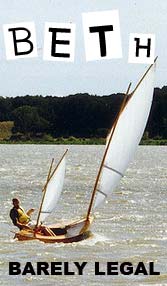The 2014 Texas 200 in a Tiny Boat
Wonders of the Shallows
Then they went into the ship again and it was driven by storms till they saw before them another little island, and the brothers went to land on it but Brendan stopped in the ship. And they put fish in a cauldron and lighted a fire to boil it, and no sooner was the fire hot and the fish beginning to boil, then the island began to quake and to move like a living thing, and there was great fear on the brothers and they went back into the ship leaving the food and the cauldron after them, and they saw what they took to be an island going fast through the sea, and they could notice the fire burning a long way off, that they were astonished. They asked Brendan then did he know what was that great wonder, and Brendan comforted them and he said "It is a great fish, the biggest of the fishes of the world, Jascönye his name is, and he is labouring day and night to put his tail into his mouth, and he cannot do it because of his great bulk." (The Voyage of Saint Brendan the Navigator, anonymous medieval author)
Different images of adventure thrive in their various shades (just a metaphor; I found no shade in Texas). One kind is the image of strange beasts. If we for the moment take the ancient epics as history - and we should not - then the history of sailing has always involved mythical strangeness. Having survived near pitch-poles and decapitating boom, I was settling in for some welcome routine when an odd thing resolved ahead. The yellow balanced lug was familiar enough but the boat seemed three times too wide; was I witnessing hyper-dimensional illusion? Heads resolved: three sailors, backs to me, and then I saw this was a hybrid creature invented in that finest of laboratories called Desperation - three Ducks lashed together with the center boat carrying the only sail and only rudder. Not that the human masters of this Frankensteinian trimaran seemed too concerned. I steered over to investigate - Chuck Leinweber was in the center boat. Josh Colvin and Andy Linn in the others; Andy held a disembodied rudder in the air to efficiently explain without words. Apparently in the haste of assembly all the loaner Ducks were using screwed-on rudder hardware, now proved too weak for the rough conditions. In a slow panic I inspected my own, but saw that John had through-bolted the rudder hardware (thanks!). They were heading to the nearby shore for repairs. Of no use to them, I bore off not knowing that I was also of no use to others beyond my sight suffering a capsize, broken mast, a concussion, more rudders tearing out of transoms, and sea-sickening tows from companions. You should read their stories in the magazine and blog of Small Craft Advisor, and wherever else they can be found.
Meanwhile I was merely entering the long ICW canal (the "land cut") with its own wonder. This is an approximately 100 foot wide straight canal that goes for miles, a highway of flat water with a following or quartering wind. In 2012 aboard John's sharpie, it had seemed magical, an experience seldom had by sailors of my region. Now, my Duck regularly planed at 5 knots, beyond hull speed, the rest of the day until I arrived at the first campsite. For me, the first Duck to arrive, the worst problem would be a long afternoon on hot beach with little to do but wait. Every blessing has at least a tiny curse.
 |
The joy of the first morning (Jason Nabors sailing). |
 |
Towing, the ultimate slow (Kellen Hatch in the shallows near Blind Pass). |
The Sloth
"Hsu Fu was advancing at a sedate rate one to two knots, though the swish of the sea through the bamboos and the fact that we were so close to the sea level rushing against our basketwork shelters gave the impression of much greater speed." (The China Voyage: A Pacific Quest by Bamboo Raft, Tim Severin)
Trying to cross the Pacific at one to two knots must have reached new levels of a sailor's worldview; I'm happy Tim Severin and crew found solace at those speeds, and one not dissimilar from the slow rate of most small boats. Slow boats are instructors of self-enclosed contentment, the highest human skill of world-building, as Mars-bound astronauts, going slowly in relative terms, will learn while falling 7 miles per second.
Most days on a Texas 200 are not about slow - there is ample wind, in the right quarter, so we tend to sail so fast that the quicker boats, say a catamaran raising shock-wave of a rooster tail leads us to pity the poor crew who arrived first to camp in early afternoon, with extra hours to dwell in a hot wind on mud that seems to have just come out of the oven. The Puddle Duck did enforce a kind of "slow" given the short, squat hull, though it could sometimes make 5 knots feel illegal. There were many slow hours, though, sometimes infuriating; at Corpus Christi I begged a sharpie-trimaran to take me aboard during hours-long doldrums: "I'll wash your dishes, scrub your bilge!" I shouted increasingly outrageous promises of indentured servitude as they passed by grinning at their simply obscene rate of 5 knots. So I do not beg for slow but rather for the attitude to use it when needed.
Speed is at once an absolute and a relative term; it can be measured and perceived - the two differ because perception supplies a rubber yardstick. My first boat, an 11-foot Lowell dory-skiff, seemed like it was going fast in a brisk wind, enveloped in a wave of its own making accentuating by big swooshingly sloshing watery sounds, rather like the Puddle Ducks. I didn't know about hull-speed back then, but I know now the dory was strolling 5 knots tops in October gusts. Knowledge may be power, but it also disappointment; the philosopher in us must ask, "Do you really want to know?" Small-boat sailors can take heart in the occasionally altered reality of sail-boat speed. The man who built my dory waxed poetic as I arrived to bring it home and we chatted about the experience of pond sailing. "You really learn to sail, learn to look for the wind, enjoy the little puffs, go a ways, stop, then get a puff from a different direction while watching the ground pass under you; it's beautiful."
Yes, we have heard somebody famous in the sailing world said, "Nobody ever complained about going fast." Honestly, slow rates are usually plain disappointing, even life-threatening if you can't beat a storm to shore. Most critical: you cannot beat somebody to the prize if you sail slowly. When there is no physical/monetary prize, then we just make one up. I'm guilty of this. Though not an Alpha personality, if there is a sailboat ahead of me, I adjust sail especially keenly to try to catch up. If one is behind, then I try to pull ahead. I'm not proud of this. One time my simple little outrigger proved so hard to catch for a Cape Dory (and I was feeling pretty snooty about it) that the skipper complained as we finally crossed wakes, "I've been trying to catch up to you for two hours to see your interesting boat."
Sometimes we make amends, as I do at times on the local lake, now dozing glassy-surfaced, my leeboard raised to reduce drag. I am free for a while, expecting nothing and so free to be mildly amazed how this dragon-fly-fart of wind has moved me a quarter-mile as somebody starts grilling hotdogs. This smell of the grill is maddening, it is in the top 6 percent of smells that evoke all that is good in life, unlocking memory's hoards of delights, and I wish I knew people on this lake who would shout, "Pull up; there's plenty on the grill!" Slow has made me envious, but also has indexed every pleasant memory (yes, yes, worry not: the smell of books in a library and salt spray crystalizing off a bow are also in the top 6 percent). I round a point on the lake so quietly we ambush a fellow fishing from his dock. Some college has its crew team out - two sculls, a motorboat, and a coach with a loudspeaker, now over-noising the call of crows, the drop of an acorn, and, yes, a lone barking dog. I am happy to let the Alpha-sailors row for mother and country; today I'm with the Betas, who are happy to hike-out in a breeze but capable of philosophical ease in the doldrums. A powerboater is infected with the mood; he slows, cuts the engine, drifts nearby for a pleasant interchange about outriggers, home-construction, and the like. Back to the ramp: a paddle through mirror water, time to look at my boat fully rigged, drawn up on the sand, the sun glowing through the sails. Another acorn drops. The dog has gone in, the crows are still talking. Redemption is possible.
Let's anchor in this double armed bay that enfolds our ship and flanks her from the way of toil. Let's stow the sails for now, unship the masts to make the vessel need to stay, and while this lasts we'll know we've come to hear, to see, to lean on a rail, to sleep against a coil of rope, to bathe with dipping pail.
We'll have the time to tilt the nose to smell the strange yet knowable scents of foreign blooms that swell in curves of petals like enough to waves curling yet slow, slow, even frozen but for a nod in a breeze, enough of slow to study what a curve is and understand all of nature's lines.
Even a sailing ship can move fast enough to blur the times. Dread the too-quick-pace, the busyness, the active afternoon, when lines and thoughts and sounds are all smudged, and tunes are worksongs for getting something merely done.
Can you hear the parrots arguing? Do you smell the rotting leaves? Lash the tiller, please, for now we pause to see the glow of marsupial eyes on bending branches. For us the wisdom of the slow. (WT)
|






